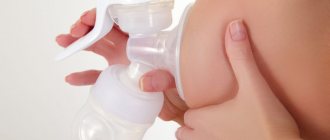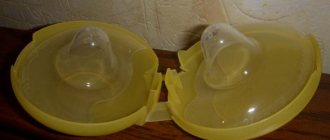Drink plenty of fluids
The importance of this factor can hardly be overestimated. For reference: the volume of food for a child in the first year of life starts at 700 ml (1/5 of body weight), gradually increasing to 1 liter per day. Accordingly, the volume of liquid consumed by a nursing mother should increase by at least 1 liter. At home, you should always have herbal teas in a thermos and boiled water (mineral water, compotes or fruit drinks) available at the same time. Combining drinking hot herbal decoctions with feeding is especially effective: you put the mug on the table and, drinking periodically, put the baby to your breast. A wonderful feeling of tide in the chest is guaranteed!
How to understand that there is not enough milk
After childbirth, the mammary glands begin to produce as much milk as the baby needs. Each time the breast is emptied after feeding or by pumping, a new portion is supplied to the vacated space.
Bottle-feeding formula milk can reduce lactation because a woman's body does not receive signals to produce more breast milk.
Although milk deficiency is rare, your baby may not have enough nutrition during the first few weeks. This happens if the mother does not breastfeed often enough or for long enough, especially when trying to stick to a schedule rather than feeding on demand.
The baby may also feel unwell or have a medical condition that makes it difficult for him to take milk.
Signs that your baby is not getting enough milk:
- Poor weight gain . On average, newborns lose 5 to 10% of their weight in the first few days after birth. But then they are supposed to gain at least 20-30 g per day and return to their weight within 2 weeks.
- The number of urinations per day is a good indicator that the child is meeting his nutritional needs. There should be at least 10-12 of them per day.
- Dehydration . If your baby has dark urine, a dry mouth, or jaundice (yellow discoloration of the skin or eyes), is lethargic, and has no appetite, he may be dehydrated.
A sign of insufficient feeding may be dehydration in the child.
Feeding a newborn frequently - about 10-12 times a day or every 2 hours - is not a sign that he is not getting enough milk.
The baby also requires the breast for comfort. It is difficult to determine how much he consumes at each feeding - the amount may vary.
The following are also not signs of milk deficiency:
- frequent requirement to breastfeed;
- desire to be held by mother;
- night awakenings;
- short and frequent feedings;
- long feedings;
- requiring a bottle of formula after feeding;
- visual reduction in breast size (compared to the first weeks after childbirth).
Herbal teas
Most herbal mixtures contain oregano, anise, fennel, lemon balm, dill, nettle, and wild strawberry leaves. All these herbs have a calming, antispasmodic effect, which has a beneficial effect on the production of oxytocin, one of the two main hormones responsible for lactation. Therefore, in case of stress, overwork, nervous exhaustion, when the production of oxytocin decreases, herbal remedies are absolutely recommended for use. But sage and thyme (thyme) should be treated with caution - they have a depressing effect on the production of breast milk.
You can prepare herbs yourself in advance, buy them at a pharmacy to make a mixture at home, or purchase ready-made herbal teas, including in filter bags.
Products that increase lactation
Lactation is a very energy-intensive process. Before you start introducing complementary foods, you feel like a little dairy farm. And nutrition during feeding should be balanced - taking into account not only losses in breast milk, but also energy spent on its creation in the mammary gland. Therefore, during breastfeeding, not only the volume of food increases (mainly due to liquid), but also its calorie content. But not at the expense of cakes and pastries! A sufficient amount of protein-containing foods will ensure adequate lactation with good quality milk. Lean meats, fish (no more than 2 times a week), cottage cheese, cheese, fermented milk products, eggs must be included in the diet of a nursing woman. Hot soups and broths made from lean veal, chicken, turkey, and rabbit stimulate lactation especially well. They should be on the menu every day.
But alcohol, including the legendary beer, as a means of increasing milk production, is absolutely prohibited. When using beer, including with sour cream, the main effect is calming and relaxing, which has a positive effect on the production of oxytocin. Herbal remedies have the same effect, and the consequences of alcohol exposure on a child’s body can be catastrophic. But you can use brewer's yeast as a source of B vitamins.
Any new product should be introduced with caution, observing the child's reaction to it for 2-3 days. And one of the main indicators is the nature of the stool. For a healthy baby in the first month of life, the norm is to pass stool after each feeding. And here Huggies® Elite Soft diapers for newborns can be your assistant, which have a unique Soft Absorb layer that absorbs loose stool and moisture in seconds. And for even more softness, the new Huggies® Elite Soft contain 100% organic cotton. The elastic waistband of the diapers fits perfectly to the baby's body, and a special pocket for loose stool will provide additional protection against leakage. Enjoy!
People's Doctor
If the diet does not help or you think that this is not enough, it makes sense to pay attention to folk remedies to improve lactation. We have listed the most popular and safe methods to help a mother who is faced with this problem.
- Regular carrots can increase lactation. This miracle property of the vegetable is due to its ability to produce prolactin. So, to prepare an effective folk remedy, grate a medium-sized orange root vegetable. Dilute the gruel with a glass of milk or half a glass of cream. The resulting medicine can be used 3 times a day.
- Among the folk remedies for increasing lactation you can always find cumin. It is used to prepare an effective drink. Just pour 1 tsp. plants with a glass of boiling milk. Let the product brew for 2 hours and drink it 20 minutes before meals.
- Dill can also increase the amount of breast milk. To prepare the infusion, pour 1 tbsp of boiling water into a glass. l. crushed dill seeds. The infusion time for this recipe is also 2 hours. The dosage of the product is half a glass, and you need to drink it twice a day.
- The popular fennel infusion is prepared in a similar way. In this recipe, you also need to pour a tablespoon of the plant with a glass of boiling water and let the product brew for 2 hours. After this time, the infusion should be filtered and taken 2 tbsp. l. before meals 3 times a day.
- The list of folk remedies for lactation would be incomplete if we did not tell you about a week-long course of treatment using chamomile flowers. The recipe is very simple: pour 1 tbsp. l. plants 200 ml. sweet boiling water. Drink a glass of the product 3 times a day for a week.
- If you are reading our article during the summer season, you can use an excellent folk remedy - dandelion leaves - to increase lactation. Pour boiling water over them or place them in cold water for half an hour: this will relieve the plant of unwanted bitterness. Make a healthy salad using dandelion leaves combined with sour cream.
- Ordinary tea can improve breast milk production, and it doesn’t matter whether you like a black or green drink. The only mandatory conditions will be to add milk to tea and a low strength of the drink. Drink tea about half an hour before feeding.
Mothers' love for various folk remedies is often due to their safety. But you must not lose vigilance in their use: first try a new remedy in a minimum dosage and monitor the baby’s reaction for 3 days. If everything goes well, then the folk remedy is right for you.
Vitamins and medications that increase lactation
During lactation, a woman’s body’s need for vitamins and microelements increases. The resulting relative hypovitaminosis can contribute to a decrease in breast function. Preference is given to multivitamin complexes containing retinol (vitamin A), tocopherol (vitamin E), thiamine (vitamin B1), ascorbic acid, microdoses of iodine, glutamic and lipoic acid. Among the biogenic stimulants, Apilak and Laktogon are used.
Considering that almost all medications pass into breast milk and, accordingly, into the baby, medications to increase lactation should be used only as prescribed by a doctor.
Lactation and menu for a nursing mother
First of all, you need to pay attention to the diet and lifestyle of the nursing mother.
The daily menu must include:
- Meat (poultry, fish);
- Milk or fermented milk products (1 liter);
- Cottage cheese (100 grams);
- Cheese (30 grams);
- Vegetables (500 grams);
- Fruits (300 grams);
- Butter (20 grams);
- Vegetable oil (25 grams).
Avoid:
- Large amounts of foods rich in carbohydrates (sugar, bread, confectionery);
- Any alcoholic drinks;
- Allergenic products: chocolate, coffee, nuts, caviar, citrus fruits;
- Hot spices and additives (onion, garlic, pepper).
Read also: What foods will help enhance lactation? | how to improve lactation: 20 most necessary foods, and more about what you can eat and what is not recommended for breastfeeding
Other ways to stimulate prolactin production. Lactation crisis
It should be noted that breast milk production is a cyclical process. There is a concept of lactation crises that occur every 1.5–2 months, when a woman’s milk supply may decrease slightly. In this situation, the most important thing is not to reduce the number of feedings, but, on the contrary, to put the baby to the breast a little more often. This stimulates milk production. And the child, as a rule, feels the approach of a lactation crisis and “stocks up” on food in advance, increasing his appetite a day or two before the start of a decline in lactation. You cannot refuse night feedings. Maximum production of prolactin occurs at night, and with proper stimulation by breastfeeding, lactation is easily restored.
These simple rules will allow you to give your baby the best gift - feeding with mother's milk. Feed for your health!
Read us on Yandex Zen
A few more important recommendations
The problem of deteriorating lactation today is not new and not at all rare. But this also has its advantages: pediatricians have long developed several effective recommendations for mothers with reduced milk production:
- before feeding, massage the mammary glands clockwise with light stroking movements;
- A shower massage will also help activate and increase milk production: move from the nipple to the sides;
- breastfeed the baby at the baby's first request;
- do not take a night break: feeding at this time guarantees complete and high-quality milk production;
- Mom’s peace and happiness is another guarantee of healthy lactation;
- During feeding, provide skin-to-skin contact with the baby;
- Pay attention to special gymnastics for the mammary glands.











